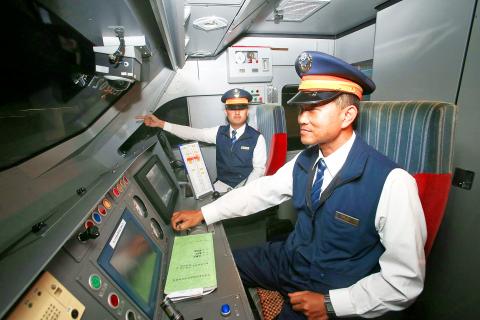The Taiwan Railways Administration (TRA) yesterday said that 228 apprentices and 10 driving assistants have been dispatched to assist drivers of express train services to promote passenger safety.
The initiative is part of reforms at the TRA that Minister of Transportation and Communications Wu Hong-mo (吳宏謀) announced on Monday after a Puyuma Express train derailment on Oct. 21 that killed 18 passengers and injured 215.
Preliminary findings by an Executive Yuan investigative team showed that the train driver, surnamed You (尤), was communicating with a train dispatcher and an inspector about a technical problem he was having for 43 minutes.

Photo courtesy of the Taiwan Railways Administration
The accident shows the risk of having only one driver on board, prompting the Ministry of Transportation and Communications’ (MOTC) decision to have two drivers operating each train.
MOTC Deputy Minister Chi Wen-chung (祁文中) yesterday morning visited the TRA to see how it was implementing the new measure.
The TRA has 18 Puyuma Express and eight Taroko Express train services.
To implement the two-driver policy, the apprentice drivers and driving assistants yesterday started assisting the drivers of the two express train services, the TRA said.
“We will see if we need to continue implementing the two-driver policy after we have ascertained that the ATPs [automatic train protection] can function reliably,” Chi said.
The TRA has six types of trains: diesel-electric locomotives, electric locomotives, diesel hydraulic locomotives, push-pull electric locomotives, steam locomotives and electric multiple units.
It takes about 23 months to train a driver to operate one type of train, and another month of training to be able to operate a different type of train, the TRA said.
The TRA Train Drivers’ Association said that it used to be a TRA policy to have two drivers on board.
“However, as the agency began acquiring new trains and safety equipment, it began experimenting with having only one driver operate the train,” the association said.
The group said it has been urging the TRA to return to a two-driver policy for all trains after the collision at Dali Train Station (大里) in Yilan County in 2007, but the agency has rejected its proposal.
Meanwhile, the Society of Railway and National Planning said that the task force entrusted to conduct a comprehensive evaluation of the TRA should take an in-depth look at the issues facing the agency.
“We absolutely understand the importance and necessity of having such a task force, but the task force should give the TRA a vision as well as strategies to achieve them before talking about reforms. It should also review how transport policies in the past have affected the TRA’s operations,” the society said.
Members of the task force should feel free to talk about what they think the problem is without fear of being punished, and all stakeholders must strive to reach a consensus on measures that the task force proposes to improve the agency, the society said.
Finally, the task force must list specific steps and timeline that the TRA must follow, which should help the agency reorganize its personnel structure, recruit workers and make budget plans, it said.

SECURITY: As China is ‘reshaping’ Hong Kong’s population, Taiwan must raise the eligibility threshold for applications from Hong Kongers, Chiu Chui-cheng said When Hong Kong and Macau citizens apply for residency in Taiwan, it would be under a new category that includes a “national security observation period,” Mainland Affairs Council (MAC) Minister Chiu Chui-cheng (邱垂正) said yesterday. President William Lai (賴清德) on March 13 announced 17 strategies to counter China’s aggression toward Taiwan, including incorporating national security considerations into the review process for residency applications from Hong Kong and Macau citizens. The situation in Hong Kong is constantly changing, Chiu said to media yesterday on the sidelines of the Taipei Technology Run hosted by the Taipei Neihu Technology Park Development Association. With

CARROT AND STICK: While unrelenting in its military threats, China attracted nearly 40,000 Taiwanese to over 400 business events last year Nearly 40,000 Taiwanese last year joined industry events in China, such as conferences and trade fairs, supported by the Chinese government, a study showed yesterday, as Beijing ramps up a charm offensive toward Taipei alongside military pressure. China has long taken a carrot-and-stick approach to Taiwan, threatening it with the prospect of military action while reaching out to those it believes are amenable to Beijing’s point of view. Taiwanese security officials are wary of what they see as Beijing’s influence campaigns to sway public opinion after Taipei and Beijing gradually resumed travel links halted by the COVID-19 pandemic, but the scale of

A US Marine Corps regiment equipped with Naval Strike Missiles (NSM) is set to participate in the upcoming Balikatan 25 exercise in the Luzon Strait, marking the system’s first-ever deployment in the Philippines. US and Philippine officials have separately confirmed that the Navy Marine Expeditionary Ship Interdiction System (NMESIS) — the mobile launch platform for the Naval Strike Missile — would take part in the joint exercise. The missiles are being deployed to “a strategic first island chain chokepoint” in the waters between Taiwan proper and the Philippines, US-based Naval News reported. “The Luzon Strait and Bashi Channel represent a critical access

Pope Francis is be laid to rest on Saturday after lying in state for three days in St Peter’s Basilica, where the faithful are expected to flock to pay their respects to history’s first Latin American pontiff. The cardinals met yesterday in the Vatican’s synod hall to chart the next steps before a conclave begins to choose Francis’ successor, as condolences poured in from around the world. According to current norms, the conclave must begin between May 5 and 10. The cardinals set the funeral for Saturday at 10am in St Peter’s Square, to be celebrated by the dean of the College